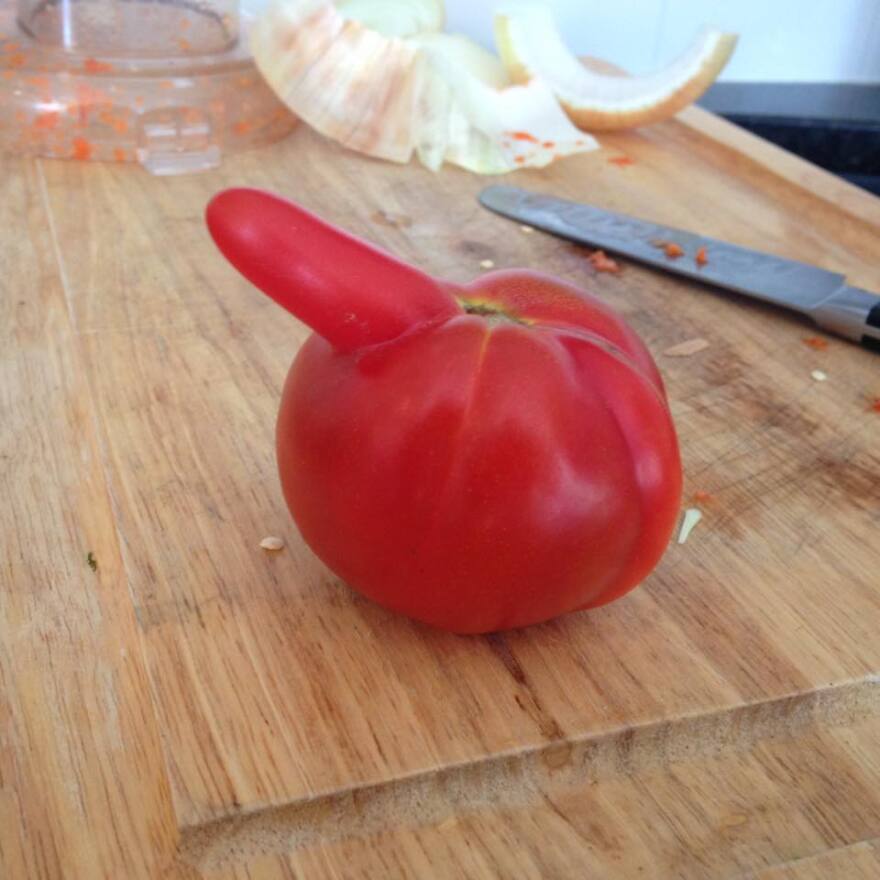As the world’s population increases, so does the demand for food. One way to keep up with demand would be, logically, to just produce more food. Some argue that a better strategy would be to simply stop wasting so much food. Granite Geek David Brooks writes about food waste for his column this week in The Concord Monitor and he joined NHPR’s Peter Biello to discuss his findings.
You write this week that a better approach to feeding the world’s growing population would be to eliminate waste—and one way to do that would be to eat more so-called “ugly food.” What do you mean by that?
Eliminating waste is almost always the cheapest and easiest way to fix any problem. In energy production they always say the low-hanging fruit is not producing more electricity, but wasting less of it. It’s the same thing with food. It’s difficult, frankly, to produce more food than we are now. We are very good at it. So the question is: how can we make sure that more of the food we grow actually gets to people?
The Guardian Newspaper estimates that 50% of the food grown in the United States for people doesn’t make it to people. It gets thrown away, fed to animals, or just plain wasted. Why is that? One of the reasons is that you, and I, and other people like us have come to have unrealistic expectations how our food should look. If it isn’t perfect, we don’t buy it. It ends up being thrown away.
Is this imperfect food any less good for us?
A lot of it just fine, which is why there have been some efforts to try to specifically sell this kind of food to us.
There’s one company that tried selling “Odd-Ball” produce, and one out of San Francisco called “Imperfect Produce.” They both sell fruits and vegetables that don’t look like the pictures they have in the cooking magazines, but that still taste perfectly fine and have all the nutrients. There’s no reason we can’t eat them.
Could a better marketing campaign convince people to buy a bruised apple, for example, if there’s a perfectly good apple sitting right next to it in the grocery bin?
Bruised could be tough. But if it’s a weirdly-shaped apple, one that looks like Richard Nixon or something, instead of the round one you expect, then probably marketing could help sell that. I don’t see why not.
One thing that might be helping, actually, at least here in the Northeast, is the increased emphasis on farmers markets, CSA’s, and home gardening. We are more used to the fact that things look kind of weird when you grow them. Like carrots that come out of the ground that don’t look anything like the ones in the store, but that taste just fine. Perhaps that is teaching us more.
I also think marketing of imperfect foods with funny names like “odd-ball” or “imperfect foods” can help.
And you write in this week’s column also that there’s another organization called “NH Gleans” which is taking a different approach to eliminating some waste.
I believe there’s more than one group that does this. They go into farmer’s fields and they glean, which means they gather up food that has not been harvested. They go in after the farmer harvests, and they glean up the stuff that the farmer didn’t pick up because people wouldn’t buy it. That food is used for charity or another source. That’s one way of doing it.
But that’s sort of a band-aide approach. It’s sort of saying, “The problem is unsolvable, so we are going to have to do this weird, extra thing to minimize it.” It would be better if more of the food that’s grown ends up with you and me, and for that to happen we need to pay money for it. And that is what farmers need.
Give us a wild prediction, David. Do you think people will, as they become more aware of it, actually start to opt for the ugly food and reduce waste?
I could see it becoming a niche market, sort of the way CSA’s and farmer’s markets were 20 years ago. I can see that happening. Whether it would move much beyond that—whether you would go into your Market Basket and see goofy looking green peppers—I’m less optimistic about that.








